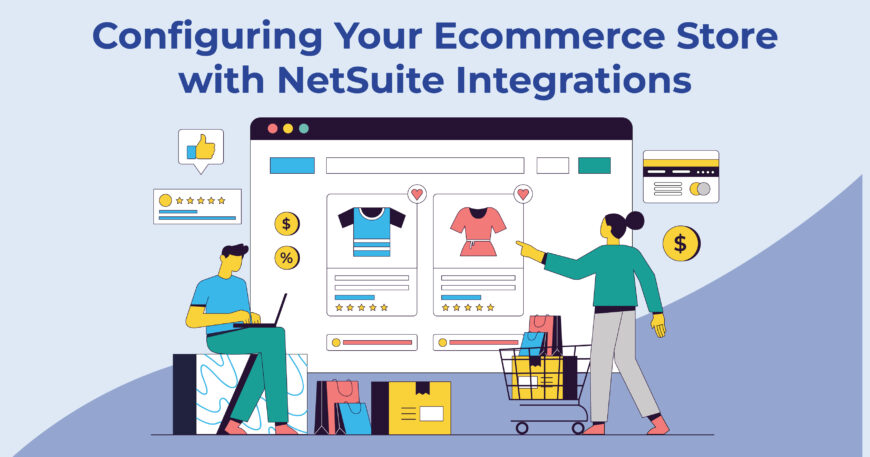If you are running an ecommerce store, you know that organization is key. But are you utilizing all of the tools available to you? If you have yet to explore NetSuite integrations, you may miss out on an efficient and streamlined way to manage your business.
NetSuite is a cloud-based software suite that offers a range of tools for businesses, including accounting, customer relationship management (CRM), and ecommerce management. Integrating these tools with your ecommerce store can increase efficiency and improve your bottom line.
In this article, we will discuss how to configure an ecommerce store with NetSuite integrations. Following our step-by-step guide, you can seamlessly integrate your store with NetSuite and use the platform’s powerful capabilities. Whether you are just starting or looking to improve your existing store, this guide will help you optimize your ecommerce management process.
Benefits of NetSuite integrations for ecommerce
Streamlining of Business Processes
Ecommerce NetSuite integrations can help businesses streamline their various business processes by automating and integrating them. This can help eliminate manual data entry, reduce errors, and improve efficiency.
Improved Data Accuracy
By integrating NetSuite with an ecommerce platform, businesses can ensure that all their data is accurate and up-to-date across different systems. This can help avoid errors, duplicates, and inconsistencies in data, leading to better decision-making and customer service.
Better Inventory Management
NetSuite integrations can help ecommerce businesses manage their inventory more effectively by providing real-time data on stock levels, tracking orders and shipments, and automating the ordering process. This can help reduce stockouts, prevent overstocking, and improve customer satisfaction.
Increased Sales And Revenue
By integrating Ecommerce NetSuite into a website, businesses can gain deeper insights into customer behavior, preferences, and purchase history. This can help enterprises to personalize their marketing campaigns, offer targeted promotions, and improve customer loyalty, ultimately leading to increased sales and revenue.
Netsuite Integrations For Ecommerce Stores
Ecommerce NetSuite is a robust cloud-based ERP solution that offers various integrations to streamline and optimize ecommerce stores.
Here are some of the direct NetSuite integrations for ecommerce stores:
NetSuite SuiteCommerce Advanced (SCA)
NetSuite SuiteCommerce Advanced is an ecommerce platform that provides businesses with a fully integrated suite of ecommerce tools, including online storefront, order management, inventory management, and customer service. It allows ecommerce stores to leverage NetSuite’s powerful back-end system to deliver a seamless shopping experience to their customers. SCA also offers a responsive design that adapts to any device, making it easy for customers to shop on the go.
NetSuite SuiteTalk
NetSuite SuiteTalk is a web services API that enables ecommerce stores to integrate their NetSuite ERP system with other applications, such as third-party ecommerce platforms, marketplaces, and custom software. SuiteTalk offers many integration options, including SOAP, REST, and ODBC, allowing businesses to connect with virtually any application or system.
NetSuite OpenAir
NetSuite OpenAir is a cloud-based professional services automation (PSA) solution that helps companies to manage their projects, resources, and finances. OpenAir offers advanced project management features, such as project tracking, time and expense tracking, and resource allocation, making it ideal for ecommerce stores that provide professional services, such as website design, digital marketing, and SEO.
NetSuite SuiteAnalytics
NetSuite SuiteAnalytics is a powerful business intelligence (BI) solution that includes ecommerce stores with real-time insights into their performance. SuiteAnalytics offers a wide range of analytics tools, including dashboards, reports, and KPIs, allowing businesses to monitor and analyze their sales, inventory, and customer data. This integration enables ecommerce stores to make data-driven decisions that can improve their overall performance and profitability.
Steps To Configure Your Ecommerce Store With Netsuite Integrations
Configuring your store with NetSuite ecommerce integrations can be complex. Here are some of the main steps to ensure a successful integration:
1. Analyzing Your Business Needs
The first step is to analyze your business needs and determine which NetSuite integrations are essential for your ecommerce store. This involves identifying the critical areas of your business that require integration, such as inventory management, order processing, and customer service.
2. Choosing The Right Netsuite Integration For Your Ecommerce Store
After identifying your business needs, the next step is to choose the proper ecommerce NetSuite integration for your online store. This involves evaluating different integration options, such as SuiteCommerce Advanced, SuiteTalk, OpenAir, and SuiteAnalytics, and selecting the best fit for your requirements.
3. Working With A Netsuite Integration Specialist
Once you have chosen your NetSuite integration, the next step is to work with a NetSuite developer who can help you configure the integration. The NetSuite developer can help you map your business processes to the NetSuite system, set up the integration, and troubleshoot any issues.
4. Customizing The Integration To Meet Your Specific Needs
Most NetSuite ecommerce integrations require some degree of customization to meet the specific needs of your ecommerce store. This involves configuring the integration to match your business processes, data mapping, and data exchange requirements.
5. Testing The Integration Before Deployment
After customizing the integration, the next step is to test it thoroughly before deploying it to your ecommerce store. This involves running test scenarios to ensure that the integration is working as expected and that all data is being exchanged correctly.
Best Practices For Managing Netsuite Integrations
NetSuite is a cloud-based enterprise resource planning (ERP) system that provides companies with powerful tools to manage their operations. NetSuite can be integrated with other software applications to increase efficiency and productivity. However, managing these integrations requires some best practices to ensure they function optimally. Here are some of the best practices for managing NetSuite integrations:
1. Regular Maintenance And Updates
Integrations with NetSuite need regular maintenance to ensure they remain compatible with the latest software versions. It’s also essential to keep the integrations up-to-date with the latest patches, bug fixes, and security updates.
2. Monitoring Performance And Data Accuracy
Monitoring the performance of the integrations is crucial to ensure that they function optimally. This includes monitoring data accuracy, processing time, and error rates. It’s also essential to track the integration’s impact on other systems, such as the website, customer portal, or CRM.
3. Integration With Third-Party Tools And Applications
NetSuite has an extensive ecosystem of third-party tools and applications that can be integrated with the software to enhance its functionality. When integrating third-party tools and applications, it’s essential to ensure they are compatible with NetSuite, meet the company’s needs, and provide a good return on investment.
4. Data Mapping And Validation
Data mapping defines the data fields that need to be integrated between NetSuite and the other systems. Validation is the process of checking the data for accuracy and completeness. Proper data mapping and validation ensure that the data transferred between systems is accurate, complete, and consistent.
5. Documenting Integrations And Processes
Documenting the integrations and procedures is essential to ensure they can be replicated, maintained, and modified. Documentation should include details such as the purpose of the integration, the data fields being integrated, the mapping rules, and the validation rules.
Conclusion
Integrating your ecommerce store with NetSuite can be a game-changer for businesses looking to streamline their operations and improve customer experience. Following the steps outlined in this blog, companies can configure their ecommerce store with NetSuite integrations and take advantage of the platform’s powerful features.
From automating order management and inventory control to enhancing marketing campaigns and leveraging data analytics, these integrations will help businesses optimize their online store’s performance and achieve long-term success in the digital marketplace. Ultimately, by configuring your ecommerce store with NetSuite integrations, you can stay ahead of the competition and provide a seamless shopping experience for your customers.
Do you have questions about Netsuite Integrations? We are here to help! Drop your questions and we’ll happily answer them!





